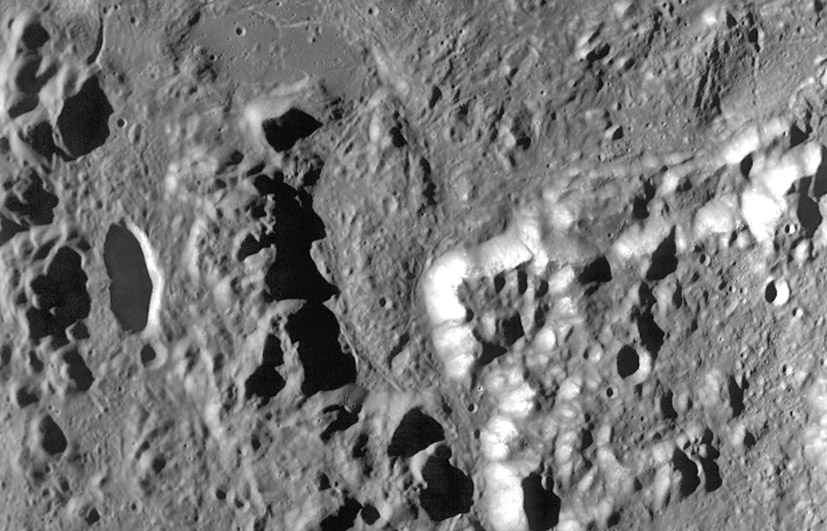Difference between revisions of "March 30, 2010"
| Line 5: | Line 5: | ||
<em>image from [http://lroc.sese.asu.edu/news/index.php?/archives/207-Chain-of-secondary-craters-in-Mare-Orientale.html#extended LROC Featured Image], [NASA/GSFC/Arizona State University]</em><br /> | <em>image from [http://lroc.sese.asu.edu/news/index.php?/archives/207-Chain-of-secondary-craters-in-Mare-Orientale.html#extended LROC Featured Image], [NASA/GSFC/Arizona State University]</em><br /> | ||
<br /> | <br /> | ||
| − | Looking out of place among all the round, rimmed craters, the elliptical depression on the left is the vent for a circular dark pyroclastic deposit on the south side of the Orientale Basin. We've seen this [ | + | Looking out of place among all the round, rimmed craters, the elliptical depression on the left is the vent for a circular dark pyroclastic deposit on the south side of the Orientale Basin. We've seen this [[April_22,_2009|before]] in brilliant color as an ultra-closeup, and now this LRO image provides surrounding details. The lack of deposits of volcanic debris around the vent is consistent with there only being an isolated [http://lpod.wikispaces.com/July+6%2C+2008 ring of ejecta] about 75 km away in all directions. This is a unique volcanic feature on the Moon and there is no obvious reason why it should be located here. Strange. Notice the reduced contrast around the vent? I enhanced the shadowed area of it revealing a hint of a bright region just below its top, this may be layering in the basin deposits that the vent cut through.<br /> |
<br /> | <br /> | ||
<em>[mailto:tychocrater@yahoo.com Chuck Wood]</em><br /> | <em>[mailto:tychocrater@yahoo.com Chuck Wood]</em><br /> | ||
| Line 16: | Line 16: | ||
<br /> | <br /> | ||
<hr /> | <hr /> | ||
| − | < | + | <p><b>Yesterday's LPOD:</b> [[March 29, 2010|Lonely Mountains]] </p> |
| − | < | + | <p><b>Tomorrow's LPOD:</b> [[March 31, 2010|The Future in Restrospect]] </p> |
| − | + | {{wiki/ArticleFooter}} | |
| − | |||
| − | |||
Revision as of 10:19, 7 February 2015
The Maw

image from LROC Featured Image, [NASA/GSFC/Arizona State University]
Looking out of place among all the round, rimmed craters, the elliptical depression on the left is the vent for a circular dark pyroclastic deposit on the south side of the Orientale Basin. We've seen this before in brilliant color as an ultra-closeup, and now this LRO image provides surrounding details. The lack of deposits of volcanic debris around the vent is consistent with there only being an isolated ring of ejecta about 75 km away in all directions. This is a unique volcanic feature on the Moon and there is no obvious reason why it should be located here. Strange. Notice the reduced contrast around the vent? I enhanced the shadowed area of it revealing a hint of a bright region just below its top, this may be layering in the basin deposits that the vent cut through.
Chuck Wood
Technical Details
LROC WAC image M102788066ME;
Related Links
Rükl plate VII
Yesterday's LPOD: Lonely Mountains
Tomorrow's LPOD: The Future in Restrospect
COMMENTS?
Register, Log in, and join in the comments.



